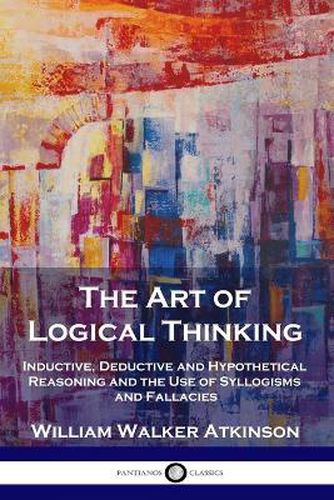Readings Newsletter
Become a Readings Member to make your shopping experience even easier.
Sign in or sign up for free!
You’re not far away from qualifying for FREE standard shipping within Australia
You’ve qualified for FREE standard shipping within Australia
The cart is loading…






This title is printed to order. This book may have been self-published. If so, we cannot guarantee the quality of the content. In the main most books will have gone through the editing process however some may not. We therefore suggest that you be aware of this before ordering this book. If in doubt check either the author or publisher’s details as we are unable to accept any returns unless they are faulty. Please contact us if you have any questions.
William Walker Atkinson, an attorney by trade, explains different kinds of logic and reasoning - deductive, inductive and hypothetical.
The author begins by describing how the mind forms ideas and concepts, and then subjects these to the mental processes of higher reasoning. The memory stores a repository of terms, which are different from concepts in that they apply exclusively to the name of things. Through reasoning the mind can arrive at a judgment of a given thing or idea, and through simple distinction can reject what is false - for instance, the notion that a horse is a cow.
Moving on from these simple examples, Atkinson describes how complex judgments and analyses are formed by the mind. Piecing together an accurate chain of events forms a kind of inductive reasoning - for example, if several people enters a store empty-handed, and later emerge with bags of fruit and vegetables, is it sensible to infer that it is a grocery store. Deriving conclusions from facts and events is forming a hypothesis; with the use of information, assertions can be made to arrive at a sensible conclusion - without personally entering said store, based on known facts it is credible to hypothesize that it sells groceries.
$9.00 standard shipping within Australia
FREE standard shipping within Australia for orders over $100.00
Express & International shipping calculated at checkout
This title is printed to order. This book may have been self-published. If so, we cannot guarantee the quality of the content. In the main most books will have gone through the editing process however some may not. We therefore suggest that you be aware of this before ordering this book. If in doubt check either the author or publisher’s details as we are unable to accept any returns unless they are faulty. Please contact us if you have any questions.
William Walker Atkinson, an attorney by trade, explains different kinds of logic and reasoning - deductive, inductive and hypothetical.
The author begins by describing how the mind forms ideas and concepts, and then subjects these to the mental processes of higher reasoning. The memory stores a repository of terms, which are different from concepts in that they apply exclusively to the name of things. Through reasoning the mind can arrive at a judgment of a given thing or idea, and through simple distinction can reject what is false - for instance, the notion that a horse is a cow.
Moving on from these simple examples, Atkinson describes how complex judgments and analyses are formed by the mind. Piecing together an accurate chain of events forms a kind of inductive reasoning - for example, if several people enters a store empty-handed, and later emerge with bags of fruit and vegetables, is it sensible to infer that it is a grocery store. Deriving conclusions from facts and events is forming a hypothesis; with the use of information, assertions can be made to arrive at a sensible conclusion - without personally entering said store, based on known facts it is credible to hypothesize that it sells groceries.